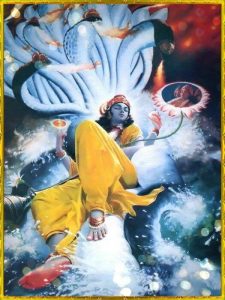Reading Time: 4 minutes
Ruchira talks about sleep, tracing its antiquity to mythologies. An exclusive for Different Truths.
 The Cambridge English dictionary defines sleep as the resting state in which the body is inactive and the mind is unconscious. In biological/medical terms it is a physical state in which a living being suspends most of his physiological activities in order to recharge and recoup. This phenomenon follows a regular rhythmic pattern: occurring once each day and spanning four-six-eight hours. Scientific researches reveal that on average human beings spend one third of their lives sleeping; this roughly works out to eight hours each day.
The Cambridge English dictionary defines sleep as the resting state in which the body is inactive and the mind is unconscious. In biological/medical terms it is a physical state in which a living being suspends most of his physiological activities in order to recharge and recoup. This phenomenon follows a regular rhythmic pattern: occurring once each day and spanning four-six-eight hours. Scientific researches reveal that on average human beings spend one third of their lives sleeping; this roughly works out to eight hours each day.
It is universally advised by doctors that each individual ideally ought to sleep for no less than eight hours so as to maintain good health and keep myriad ailments at bay.
It is universally advised by doctors that each individual ideally ought to sleep for no less than eight hours so as to maintain good health and keep myriad ailments at bay. However, in the present-day milieu of rat race and jet-set lifestyle, sleep has become a rare commodity, a luxury few can afford.
Before it gets too boring, it would be worthwhile to delve into the past to understand the pride of place which sleep enj0ys in human life.
In Greek mythology, Morpheus, is the deity of Dreams while his mother, Nyx, is the personification of Night. The Romans believe Morpheus was the son of Somnus, the God of Sleep.
In Greek mythology, Morpheus, is the deity of Dreams while his mother, Nyx, is the personification of Night. The Romans believe Morpheus was the son of Somnus, the God of Sleep. The impact of Greco-Roman legends on European culture is visible in the popular English idiom, ‘In the arms of Morpheus’ (to be asleep).
Who has not heard of the story of Rip Van Winkle, written by the American author Washington Irving? Winkle, a Dutch-American villager who lived in colonial America, one day fell asleep in the Catskill Mountain region. He woke 20 years later only to discover that the American Revolution which had taken place, during that period, had ushered in far reaching changes.
Grimm Brothers’ fairytale, The Sleeping Beauty, with its romantic connotation … is popular with old and young alike.
Grimm Brothers’ fairytale, The Sleeping Beauty, with its romantic connotation – a princess falls asleep after a minor thumb pricking accident, to be awakened by her Prince Charming after a considerable length of time – is popular with old and young alike.
Closer home, Indian epics, myths legends and folklore are replete with sleep related incidents and anecdotes. Aeons ago, Lord Shiva was apparently divulging the secret of immortality with his consort Parvati. Halfway through the narrative Parvati fell asleep, and the secret was imbibed by a pigeon duo who became immortal. This is the legend behind the holy cave of Amarnath.
Likewise, in the Mahabharata we find Arjuna sharing the intricacies of the layout of the Chakravyuh(maze) with Draupadi, who is carrying their offspring Abhimanyu in her womb. Having heard the entry plan, Draupadi dozes off; unfortunately, the yet unborn child who had been listening all the while is unable to grasp the exit plan. This eventually leads to his untimely demise at the hands of veterans.
He requests Nidra to allot his quantum of sleep to his wife in addition to her own fair share. As a result of this boon, Urmila ends up sleeping all day and all night through the 14 long years.
In the Ramayana, we find the loving dutiful Laxman following his older sibling and his spouse into the wilderness. However, the thoughts of leaving his bride Urmila behind torments him no end. In the forest, he accosts Nidra Devi (goddess of slumber). He requests Nidra to allot his quantum of sleep to his wife in addition to her own fair share. As a result of this boon, Urmila ends up sleeping all day and all night through the 14 long years. Her pangs of suffering are thus lessened.
A conspicuous figure in the Ramayana is Ravana’s brother Kumbhakarna who sleeps for half of the year. In common parlance therefore his name is synonymous with a ‘heavy sleeper’ or one who overshoots his sleeping period.
It is believed that during monsoon Vishnu lapses into his four-month long sleep. During this hiatus he waits for the pralaya (deluge) to cleanse the earth of all the dross.
Lord Vishnu, the second of the (Hindu) Holy Trinity is depicted as reclining forever

on the back ofsheshnaga (serpent king), who manages to stay afloat on Kshir Sagar (the ocean of milk). This posture is known as anantha shayanam. It is believed that during monsoon Vishnu lapses into his four-month long sleep. During this hiatus he waits for the pralaya (deluge) to cleanse the earth of all the dross.
Sleep is an inalienable part of people’s daily routine, more so in the warmer (tropical/ coastal) regions. Post lunch, an archetypal Malayali will loll in the shady veranda, while the Babumoshai would embark on a bhaat ghum. Thousands of miles away, in Mediterranean countries, shopkeepers down their shutter to indulge in siesta.
Ask the mother of toddler/s what sleep means to her. You will be told her happy hours commences once the kid/s have slept.
Ask the mother of toddler/s what sleep means to her. You will be told her happy hours commences once the kid/s have slept. For such a woman the sight of her dormant children is nothing short of a placebo, or a tranquiliser to soothe frayed nerves. During this interval she may be lucky enough to catch forty winks.
In all cultures and civilisations, we come across a repertoire of mellifluous lullabies /cradle songs, commonly sung by mothers, aunts and grannies to lull the tiny tots into slumber, so vital for their well being. Which only helps to underscore the importance of sleep for all humans.
Photo from the Internet














Sleep is one thing which will find a richman or poor alike , and even discomfort of space; place; material does not matter when it comes aknocking.
Nice read. thank you.
I would love to know why Kumhkaran sleeps 6 months at a time- what is the story behind it .
Thank you Ruchira